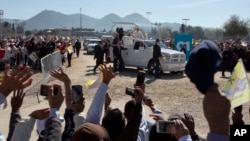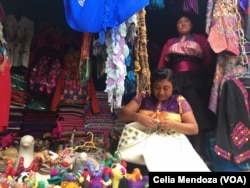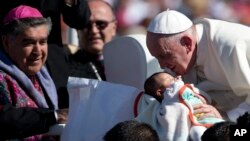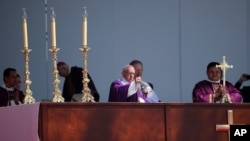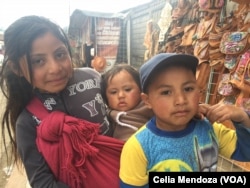Thousands of Mexicans gathered in a sports field in the impoverished southern state of Chiapas for an open-air mass Pope Francis conducted in three indigenous languages — Chol, Tzotzil and Tzeltal.
Pope Francis asked Mexico's indigenous population Monday for forgiveness for the exclusion they have suffered by society.
"On many occasions, in a systematic and organized way, your people have been misunderstood and excluded from society," the pope said.
"Some have considered your values, culture and traditions to be inferior. Others, intoxicated by power, money and market trends, have stolen your lands or contaminated them."
During the service, Francis issued a decree allowing indigenous languages to be used during Catholic masses.
He also warned that the Earth faces "one of the greatest environmental crises in world history."
"The Earth herself, burdened and laid waste, is among the most abandoned and maltreated of our poor; she groans in travail," he said, adding that "the environmental challenge that we are experiencing and its human causes, affect us all and demand our response."
Francis arrived by aircraft Monday in the Mexican mountain town of San Cristobal de las Casas, a center of Mayan indigenous culture.
San Cristobal is home to two of the most famed religious defenders of indigenous people in Mexican history: Bishops Bartolome de las Casas in the 16th century and Samuel Ruiz, who died in 2011.
Many officials accused Ruiz, who evangelized many indigenous, of acting on behalf of Zapatista rebels in their 1994 uprising for greater indigenous rights.
From San Cristobal, the pope visits Morelia, the capital of the western state of Michoacan where farmers in 2013 took up arms to battle the so-called Knights Templar drug cartel.
On Sunday, Francis held an open-air Mass for some 300,000 Roman Catholic faithful in Mexico City's gritty suburb of Ecatepec.
The pontiff spoke out against the drug trade and associated violence; a central theme of his five-day visit.
On Saturday, the Pope called on Mexican leaders to provide "true justice" and security in the country after years of endemic drug violence, official corruption and poverty.
Francis told President Enrique Peña Nieto and assembled lawmakers in Mexico City they have a responsibility to help citizens gain access to "indispensable material and spiritual goods," including housing, employment and a peaceful environment.
In a separate address to Mexican bishops, Francis urged the clerics to take a more aggressive stand against drug trafficking and corruption. He challenged church leaders to denounce what he called the "insidious threat" posed by trafficking.
Francis caps his visit Wednesday in the U.S.-Mexican border town of Ciudad Juarez, Mexico's former murder capital, where he is expected to address issues of crime, trafficking and migration.




